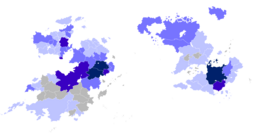Ezekielans: Difference between revisions
mNo edit summary |
No edit summary |
||
| Line 37: | Line 37: | ||
}} | }} | ||
'''Ezekielans''' ({{wp|Neo-Aramaic language|Amaric}}: ܐܚܝܢܐ ''Ahyana'') are an {{wp| | '''Ezekielans''' ({{wp|Neo-Aramaic language|Amaric}}: ܐܚܝܢܐ ''Ahyana'') are an {{wp|ethnoreligious}} group which originated from modern-day [[Tsabara]]. [[Ezekielanism]] and "Ezekielan-ness" are closely intertwined, although it is possible to be an Ezekielan without being an adherent of Ezekielanism, and vice-versa. Despite this it is often classified as an {{wp|ethnic religion}}. | ||
The Ezekielan nation originated from [[Ezekielanism|early Ezekielanism]], a religious movement which splintered from [[Sotirianity|early Sotirianity]]. The Ezekielanists believed that [[Ezekiel|Ezekiel Khristos]] was the son of {{wp|Jesus Christ|Jesus Soter}}, and had formed a new covenant between {{wp|Mankind}} and {{wp|God in Christianity|God}}. After Ezekiel went into {{wp|occultation}} in 67 AD, his followers attempted a failed revolt against the [[Solarian Empire]]. This event, combined with religious and political upheaval in modern-day [[Tsabara]], and missionary movements, led to the formation of a {{dp|diaspora}}. Early Ezekielanists were universalist proselytisers, competing with Nicene Sotirianity and other Sotirian strands for several centuries, until Nicene Sotirianity became the established religion of the Solarian Empire. While missionary activities continued elsewhere, particularly in [[Bahia]], the Ezekialanist sect became the {{wp|ethnogenesis}} for the Ezekielan nation. | |||
Later history | Later history | ||
Revision as of 21:48, 5 March 2024
ܐܚܝܢܐ Ahyana | |
|---|---|
 | |
| Total population | |
| ~20 million | |
| Languages | |
| Liturgical: Predominantly Spoken: Historically: tbd | |
| Religion | |
| Ezekielanism | |
| Related ethnic groups | |
| Atudites, Syriazi |
Ezekielans (Amaric: ܐܚܝܢܐ Ahyana) are an ethnoreligious group which originated from modern-day Tsabara. Ezekielanism and "Ezekielan-ness" are closely intertwined, although it is possible to be an Ezekielan without being an adherent of Ezekielanism, and vice-versa. Despite this it is often classified as an ethnic religion.
The Ezekielan nation originated from early Ezekielanism, a religious movement which splintered from early Sotirianity. The Ezekielanists believed that Ezekiel Khristos was the son of Jesus Soter, and had formed a new covenant between Mankind and God. After Ezekiel went into occultation in 67 AD, his followers attempted a failed revolt against the Solarian Empire. This event, combined with religious and political upheaval in modern-day Tsabara, and missionary movements, led to the formation of a Template:Dp. Early Ezekielanists were universalist proselytisers, competing with Nicene Sotirianity and other Sotirian strands for several centuries, until Nicene Sotirianity became the established religion of the Solarian Empire. While missionary activities continued elsewhere, particularly in Bahia, the Ezekialanist sect became the ethnogenesis for the Ezekielan nation.
Later history
Culture
Name and etymology
Ezekielan - overarching name, mainly academic not used by Ezekielans
Ahyana - meaning Kinsmen, but usually translated to Brethren. Name preferred for community as a whole.
Mirite - The name Mirite is a Gallicisation of the Classical Machaï word ⲙⲓⲣⲓⲏⲧ, mirieit meaning "new person". Used by Bahian Ezekielans.
Other names
